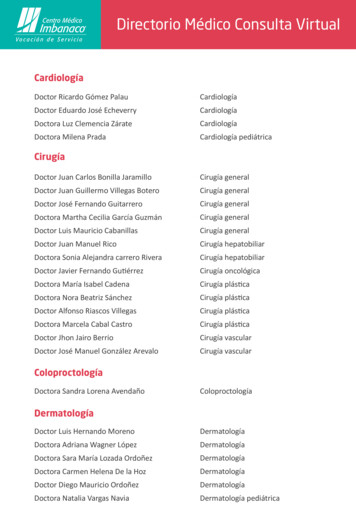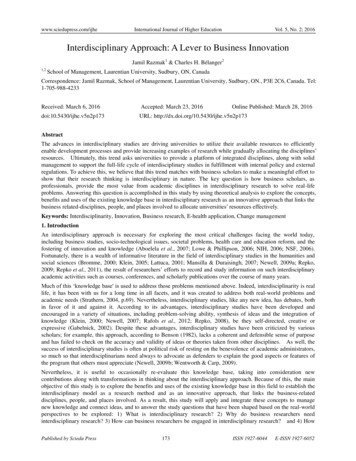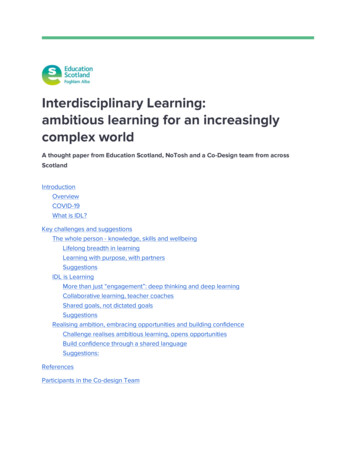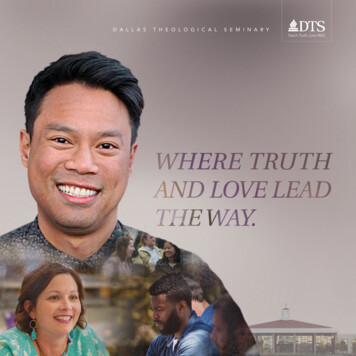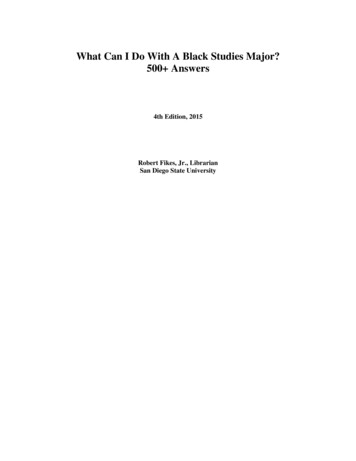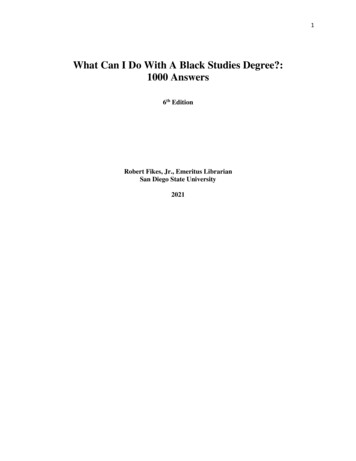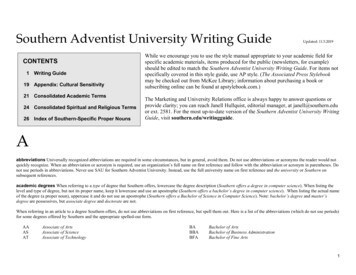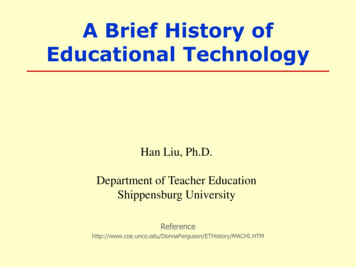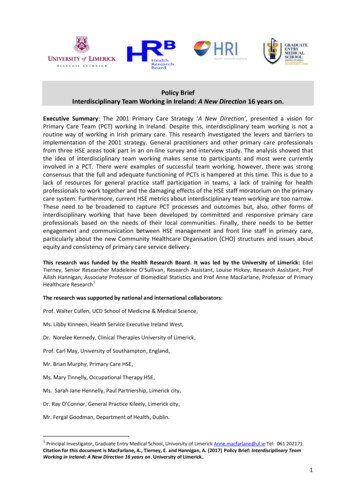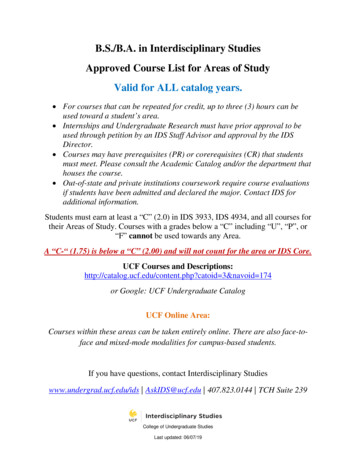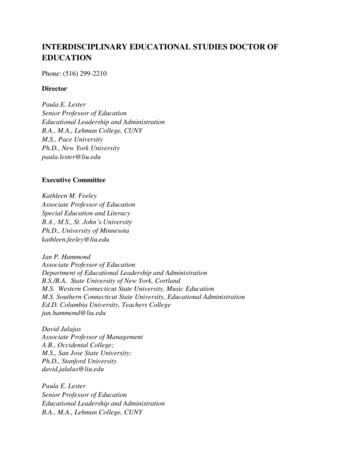
Transcription
INTERDISCIPLINARY EDUCATIONAL STUDIES DOCTOR OFEDUCATIONPhone: (516) 299-2210DirectorPaula E. LesterSenior Professor of EducationEducational Leadership and AdministrationB.A., M.A., Lehman College, CUNYM.S., Pace UniversityPh.D., New York Universitypaula.lester@liu.eduExecutive CommitteeKathleen M. FeeleyAssociate Professor of EducationSpecial Education and LiteracyB.A., M.S., St. John’s UniversityPh.D., University of Minnesotakathleen.feeley@liu.eduJan P. HammondAssociate Professor of EducationDepartment of Educational Leadership and AdministrationB.S./B.A. State University of New York, CortlandM.S. Western Connecticut State University, Music EducationM.S. Southern Connecticut State University, Educational AdministrationEd.D. Columbia University, Teachers Collegejan.hammond@liu.eduDavid JalajasAssociate Professor of ManagementA.B., Occidental College;M.S., San Jose State University;Ph.D., Stanford Universitydavid.jalalas@liu.eduPaula E. LesterSenior Professor of EducationEducational Leadership and AdministrationB.A., M.A., Lehman College, CUNY
M.S., Pace UniversityPh.D., New York Universitypaula.lester@liu.eduJoseph PiroAssociate Professor of EducationCurriculum and InstructionB.A., St. Francis CollegeM.A., City University of New York, Queens CollegeM.S., Fordham UniversityM.A., Ph.D., Teachers College, Columbia Universityjoseph.piro@liu.eduR. H. Red OwlProfessor of EducationEducational Leadership and AdministrationA.B., Erskine CollegeM.P.A., Georgia State UniversityPh.D., University of Georgiaredowl@liu.eduJune Ann SmithAssociate Professor of EducationCounseling and DevelopmentB.A., Northern Caribbean University (formerly West Indies College)M.A., Andrews University; M.S.W., Yeshiva UniversityPh.D., Andrews Universityjsmith@liu.eduAll other faculty in the College of Education, Information, and Technology support the Ed.D.Program and its students.Program OverviewThe program brings broad perspectives to important issues in education and focuses on the studyof theory, practice and issues affecting the Pre-K-16 continuum and other education relateddomains (e.g. professional development, etc.). Minimum requirements include satisfactoryperformance in all coursework within the 10 year time frame, completion of the residencyrequirement, and a doctoral dissertation. This program leads to the granting of the Doctor ofEducation (Ed.D.) degree.
Success in the program depends in large part on your own initiative. Students are stronglyencouraged to read broadly, to actively consult, to interact with faculty and fellow students, andattend meetings related to your profession and areas of study.At the completion of the program, graduates are expected to be better prepared to think acrossparadigms, broadening and deepening their perspectives regarding key issues. Applying differentapproaches to critical questions in education and related areas and contributing in a critical andmeaningful way is the foundation for study in this program.Program PhilosophyThe Ed.D. Program is built on the belief that research needs to be conducted not only within theUniversity, but also in the “laboratory of the everyday”—in classrooms, schools andcommunities, and other organizations and settings. In this program, the many complex factorsthat make up learning communities, as well as the responsibilities of leaders within thosecommunities, will be examined. This is based on the conviction that educational research thatfails to consider the context of schools and learning communities frequently misses the manyvariables inherent in cultures, communities, language, changes in state-level policies, advancesin technology and more. Graduates of this program will produce research that addressesidentified needs in particular communities of learners.Admission RequirementsApplicants must hold a Master’s Degree in education or a related field. Additionally, allapplicants must have at least three years of successful teaching, leadership, or equivalentexperience. Admission decisions will be based on the following factors: academic proficiency,professional accomplishments, proposed intellectual focus, and potential for completing arigorous program. After an initial review of applications and supporting documents, someapplicants will be invited for a personal interview.Applicants must submit the following material by May 1st if they wish to begin classes in the FallSemester.1. A completed application form (available online).2. A statement of purpose that describes their educational and professional goals and discusseswhat they hope to gain from doctoral study at Long Island University. The Statement of Purposeshould be computer-generated and double-spaced.
3. A statement of research/inquiry describing the applicant’s primary areas of research/inquiryinterest. The statement should be 1 to 3 pages in length.4. Two official copies of all undergraduate and graduate transcripts (from each college oruniversity where courses leading to a Bachelor’s and/or Master’s degree were taken. Transcriptsof all other coursework deemed relevant to the program should also be submitted. Transcriptsmust be sent in sealed envelopes with the Registrar’s signature across the seal.5. Three letters of recommendation. These letters should be written by persons who can commentfrom personal knowledge on academic and/or professional qualifications of the applicant forgraduate study. Applicants to the Ed.D. Program must submit one letter of recommendation froma current or former instructor or professor. An employer, school principal, or superintendentmust write one other recommendation. Either an employer, former instructor, or professionalcolleague of status may write the third letter of recommendation.6. A copy of a publication or a sample of other scholarly writing.Residency and Registration RequirementsAll work for the doctoral degree must be completed within ten (10) years from the date of thestart of the program. Due to the cohort format of the program and inconsideration of theUniversity resources available both for classroom study and research, students are required tomaintain registration in every semester until and including the term in which the dissertation isapproved by the Doctoral Program faculty and Dean of the College.Every student must fulfill a residency requirement, which will require the student to be registeredfor courses as a full time student for two consecutive semesters and for two consecutive summersessions. The residency requirement will be fulfilled automatically for all students who followthe standard cohort plan. Students who miss courses scheduled for their entry cohort may beallowed to join a subsequent cohort when the missed coursework is offered.Academic PoliciesThe academic policies that govern doctoral students are outlined in a handbook that is given toall students after they have been admitted to the program.Candidacy for the DegreeUpon admission to the program, students become “doctoral students” or doctorants and remain inthat status until they have completed their digital portfolio, the comprehensive exams, and havesuccessfully defended their dissertation proposal. At that time, they are advanced to the status of“doctoral candidate” and may use the initials ABD (all but dissertation) as an indication of their
advanced status in the doctoral program. That designation expires with any applicable statutes oflimitation.All students must be eligible for candidacy. To be eligible, students must successfully completethe following: the portfolio, the comprehensive exam, and the oral comprehensive exam. Thefollowing requirements provide the basis for doctoral candidacy.Digital Portfolios. The Ed.D. Digital Portfolio will provide evidence of the doctoral student'sintellectual development and achievement during the coursework phase of the doctoral program.Each doctoral student will assemble a Digital Portfolio that includes: (a) a cover page and anindex with hyper-links to all materials in the Portfolio; (b) one paper or project from eachdoctoral course completed in the first two years (36 credits) of the program; and (c) a writtenpersonal reflection (of eight to ten pages) in APA style on the role and nature of InterdisciplinaryStudies in Education with a special emphasis on the student's primary area of interest. Allmaterials in the Portfolio must be in an Internet-accessible digital format and should include suchresources as Adobe PDF or Microsoft Word documents, websites, images, videos or other digitalmedia.The Portfolio should be developed with the guidance of the student’s dissertation committeechair who will also have the authority to approve the Digital Portfolio.Written and Oral Comprehensive ExamsThe Doctoral Program Executive Committee has developed an approach that fulfills theevaluative and assessment objectives of the Comprehensive Exams and also maximizes theirvalue as an integral component of the learning experience for our students. The format of thecomprehensives avoids unnecessary or redundant retesting of students' mastery of course contentknowledge that would already have been assessed by individual course instructors. The design ofthe comprehensives is intended to advance students' progress toward their dissertation research.The Comprehensive Exams include a research précis that demonstrates the research methods,skills, and perspectives developed during the student’s core (covering research skills andmethods) courses and reflects the knowledge they developed in their field.Research Précis. The written portion of the Comprehensive Exams will be a research préciscomprising three components: The first component is a preliminary literature review related to the student's proposed area ofdissertation research and should reflect both an understanding of research and of the student'sfield of expertise [about 10 double-spaced pages plus References]. The second component is a discussion of the proposed research methodology (includingphilosophical perspectives, analytic methods, sample, instruments and measures) and itsstrengths and limitations [about five to seven pages plus References].
The third component is a statement describing the interdisciplinary nature of the proposedresearch and of its benefits.The written portion of the Comprehensive Exams will be assessed by the dissertation committeechair and one other member of the dissertation committee, as designated by the chair. In theevent of a split judgment, the third member of the committee would be asked to break the tie. Iftwo members of the committee find the exam not ready for approval, the committee will offercorrective advice to the student and ask that the research précis be revised and resubmitted.Orals. The oral portion of the Comprehensive Exams will be achieved by having the studentmake an oral presentation of the research précis to the three-person dissertation committee. Themembers of the committee will use that presentation as an opportunity to explore the student'smastery of the content knowledge and understanding of theory and research in the student’sspecialization, as it relates to the student’s planned dissertation topic.Dissertation RequirementsUnder the guidance of a dissertation committee as described in the Ed.D. Student Handbook, thestudent must develop and successfully defend a dissertation proposal and subsequently, developand defend a final dissertation of scholarly and professional value.CurriculumStudents must complete a minimum of 51 credits beyond the master’s degree, including eightcore courses (24 credits), six field courses (18 credits), and a minimum of three courses ofdissertation preparation (9 credits). In addition, students must successfully pass a written and oralcomprehensive examination, a dissertation proposal defense, and a dissertation defense. Thestatutory limit for completion of all degree requirements is five years after a student passes thequalifying examination. Normal progression through the program is as follows:1. Required doctoral level core courses (24 credits)2. Required doctoral level field courses (18 credits)3. Development and presentation of a working portfolio4. Written comprehensive examination5. Oral comprehensive examination6. Dissertation proposal preparation7. Dissertation proposal defense8. Dissertation research
9. Dissertation defense10. GraduationStudent Cohort GroupsEach incoming class of students will enter the doctoral program as a cohort. Every cohort willtravel together as an interdisciplinary groupProgram Requirements Core (24 Credits)EDD 1000: Pro-Seminar in the Philosophy of Science and Interdisciplinary Approaches toEducational Studies (3 credits)EDD 1001: Multiple Perspectives on Educational Policy Analysis and the History of EducationalReform (3 credits)EDD 1002: Organizational Theory: Approaches to Studying and Analyzing SchoolOrganizations (3 credits)EDD 1003: Psychological, Sociological, and Cultural Aspects of Human Development (3credits)EDD 1004: School and Community: Policy and Practices (3 credits)EDD 1005: Educational Research Methods I (3 credits)EDD 1006: Educational Research Methods II (3 credits)EDD 1007: Applied Research Design in Educational Studies (3 credits)Field Courses from the Following (18 credits)EDD 1101: Collaborative Team Models in Education (3 credits)EDD 1102: Facilitating Transitions Throughout the Educational Process (3 credits)EDD 1103: Sociopolitical Contexts of Multicultural Education (3 credits)EDD 1104: Bilingual and Second Language Acquisition (3 credits)EDD 1105: Contemporary Issues in Assessment and Evaluation (3 credits)EDD 1106: Technology-Enhanced Teaching and Learning (3 credits)EDD 1201: Educational Reform: An Interdisciplinary Theoretical Perspective (3 credits)
EDD 1202: Perspectives on Leadership, Restructuring and Teacher Empowerment (3 credits)EDD 1203: Seminar in Fiscal, Legal and Human Resource Issues in School Renewal and Reform(3 credits)EDD 1204: Public and Community Relations: Creating an Environment Conducive toEducational Reform (3 credits)EDD 1205: Critical Issues and Trends in Pre-K – 16 Education (3 credits)EDD 1206: School Reform: Instructional Leadership in Pre-K – 16 Settings (3 credits)Dissertation Courses (9 credits minimum)EDD 1008: Dissertation Seminar I (3 credits)EDD 1009: Dissertation Seminar II (3 credits)EDD 1010: Dissertation Advisement (3 credits)EDD 1011: Continuing Dissertation Advisement (1 credit), repeated every semester whiledissertation research is in progress)Interdisciplinary Education Studies Course Descriptions Core CoursesEDD 1000 Pro-Seminar in the Philosophy of Science and Interdisciplinary Approaches toEducational StudiesThis foundational seminar must be taken in the first year in the Ed.D. Program. It is designed togive students a meaningful context for the development of knowledge as part of a processgrowing out of their own experiences. It will examine the underpinnings of belief structures andparadigms, and will explore alternate ways of knowing. Students will explore the philosophical,political, sociological, psychological, and scientific basis of knowledge and approaches toproblem solving. Educators, educational leaders, and students alike embody personal, cultural,and socially-constructed beliefs and practices, concepts and norms that strongly influence howthey perceive and structure their educational experience. Students will explore the nature ofinterdisciplinary research and problem-solving. They will begin their development ofinterdisciplinary perspectives and methods as an approach to analyzing and understanding thecomplex problems facing education.
EDD 1001 Multiple Perspectives of Educational Policy Analysis and the History ofEducationThis course surveys the history o American education and focuses on multiple forces (social,intellectual, cultural, political, etc.) that have shaped education policy and practice. At the sametime, the course analyzes important reform efforts since the beginning of public education in theUnited States and considers their intended and unintended consequences. The course alsoidentifies different ways that education reform and policy define educational success, democraticeducation, and what it means to prepare citizens in an increasingly global world.EDD 1102 Organizational Theory: Approaches to Studying and Analyzing SchoolOrganizationsThis course addresses multiple approaches to the study of organizations, organizational behavior,and practices of managing and leading people within the context of public schools. Students willlearn how organizations are structured and shaped, what features vary and how they vary, andwill better understand how organization theory helps explain organizational structure andbehavior. Students will better understand the dynamics of schools and school personnel, as wellas the organizational culture that guides and defines public education. Emphasis will be placedon knowledge of principles and issues relating to fiscal operations of school management, schoolfacilities, and the use of space, and to legal issues impacting school operations. With thisknowledge, students will discuss conditions that influence leadership and will be better preparedto facilitate organizational change, to enhance their leadership styles, and to improve schooleffectiveness.EDD 1003 Psychological, Sociological, and Cultural Aspects of Human DevelopmentThe purpose of this course is to involve students in tracing the historical path leading to ourcurrent understanding of the ways in which psychological, social, and cultural factors intersectand serve as the basis for human development. Field based experiences will enable students toexplore and analyze human interactions in educational settings from multiple perspectives.EDD 1004 School and Community Policy and PracticesThis course draws on the knowledge and understanding of policy analysis and effective changestrategies, with a specific focus on the diverse social and cultural aspects of a community andthose aspects’ influence on goals for teaching and student learning. Students will developinterdisciplinary strategies for learning about and communicating with the greater community.The course will acquaint students with the political forces that propel and shape public educationat the local, state, and national levels, and with the social issues that impact the operation ofschools and school districts. Students will gain an understanding of community relations and willbe able to employ collaborative strategies and processes of communication, in order to exploreemerging issues and trends that potentially influence the school community.
EDD 1005 Educational Research Methods IStudents will be introduced to the principle of multi-trait, multi-method, interdisciplinaryresearch methodology. They will be encouraged to apply multiple methods in empirically-based,interdisciplinary research, requiring advanced skills in both qualitative and quantitative modes ofinquiry. This course explodes the fundamental elements of empirically based ,qualitativeresearch methods ,including: framing research questions, gaining access as a participant observer,interviewing techniques, journal keeping ,data collection, coding and validity/reliability testing,and data analysis. Particular attention will be given to understanding the nature of qualitativeresearch and to the notion that research methods influence observation and conclusions .Uponcompletion, participants will be able to demonstrate the ability to plan, carry out, and analyze aqualitative research project. Prerequisite: EDU 1000 in-progressEDD 1006 Educational Research Methods IIBuilding upon the perspectives and skills developed in Educational Research Methods I, thiscourse explores the application of parametric and non-parametric, multivariate statistics andother quantitative research techniques to the design of empirically-based, interdisciplinary, multimethod studies. A background in basic descriptive and inferential statistics is required. Emphasiswill be placed on sampling design, data collection and coding, data transformations,distributional assumptions and the selection of appropriate statistical models, and the proficiencyin using standard statistical software. As a result of this course, students will have the tools toplan and implement quantitative research components of empirically-based, multi-method,interdisciplinary research projects. Prerequisites: EDU 1000, EDU 1005, and a recent graduatecourse in basic statistics or permission of the instructorEDD 1007 Applied Research Design in Educational StudiesThis course provides students with the opportunity to plan and carry out research projects using amulti-method, interdisciplinary, theoretical framework and the methods explored in previouscourses. The research will utilize appropriate mixed models drawing on multiple researchtraditions and will include both qualitative and quantitative components. Students will beencouraged to select an area of study that focuses on contemporary educational issues.Prerequisites: EDU 1000, EDU 1005, and EDU 1006EDD 1101 Collaborative Team Models in EducationDrawing on multiple disciplines and an interdisciplinary perspective, this course presentseffective collaborative team models that facilitate the inclusion of diverse learners into generaleducation at the elementary, middle, and secondary school levels. Specific populations targetedinclude students with special needs, as well as those from varied cultural backgrounds. Roles ofkey players from differing disciplines are examined in relation to a trans-disciplinary team
model. Case studies are utilized to illustrate the positive effects that collaboration can have onstudents, educators, families, and communities with diverse need and backgrounds.EDD 1102 Facilitating Transitions Throughout the Educational ProcessThis course will examine, from an interdisciplinary perspective, effective ways that educatorscan facilitate the critical transitions that students experience throughout the educational process.Specific attention will be given to the following: cognitive changes, such as those indevelopmental stage and conceptual level; social functioning, such as transitions from family toinstructional learning, community membership, culture; and preparing students for postsecondary experiences, such as vocational (career) and college.EDD 1103 Sociopolitical Contexts of Multicultural EducationThis course will explore the constant and complex interplay and interactions among personal,social, political, and education factors in exploring the success or failure of students in schools.Research that contributes to the understanding of the complex process of education, andparticularly multicultural issues in education, will be examined from an interdisciplinaryperspective. Specific attention will be given to: the impact of racism on schooling; discriminationand expectations of students’ achievement; structural factors such as school organization andeducational policies and practices; and cultural and other differences such as ethnicity, race,gender, language, and class. A rationale for multicultural understanding in an interdisciplinarymodel will be developed as class members examine case studies about the home, school,community experiences of successful students from various backgrounds, and come tounderstand how these factors influenced school achievement.EDD 1104 Bilingual and Second Language AcquisitionThe purpose of this course is to establish a theoretical framework for understanding the processof acquiring a second language. Students will become familiar with and will evaluate researchdesigns, issues, and theories in second language acquisition, and will consider their possibleapplication to working with English-language learners in settings ranging from early childhoodto secondary schools. Students will also explore alternative approaches by conducting originalresearch that reflects the interdisciplinary nature of second language acquisition.EDD 1105 Contemporary Issues in Assessment and EvaluationThis course is designed to explore the ways in which assessment and evaluation can beconstructed to address learners with diverse strengths and needs. An historical framework oftesting and assessment/evaluation will be defined, and will be understood as a springboard fromwhich current views and practices were developed. Current political and sociological factorsimpacting testing movements will be examined. Consideration for the restructuring of testing andassessment/evaluation will focus on: the needs of students; the link between instruction and
assessment; the relationship between and among local classroom and building needs; districtpolicies and practices; and state curricula, standards, and testing programs.EDD 1106 Technology-Enhanced Teaching and LearningThis course is designed to explore the unique possibilities to integrate educational technologywith subject domain learning. Students will explore the research, theory, and applications fromtheir investigations in the field of educational technology. They will integrate these findings withtheir understanding of the content and pedagogy of literacy education, to create an essentialcontext for meaningful development of literacy enhanced curriculum models. These models caneffect dramatic change in how reading, writing, and critical thinking are taught and learned.EDD 1201 Educational Reform: An Interdisciplinary Theoretical PerspectiveThis course provides an analysis of reform and school leadership against the backdrop ofeducational administration theories. Emphasis will be placed on using different theoretical andinterdisciplinary perspectives to analyze the causes of problems in schools. Students will come tounderstand how different theoretical frameworks lead policy analysts to look at problemsdifferently, and will focus on a variety of types and sources of information concerning theirpossible causes.EDD 1202 Perspectives on Leadership, Restructuring, and Teacher EmpowermentThis course provides a historical perspective of restructuring and empowerment. Emphasis willbe placed on the key dimensions of empowering leadership. As a result, students will have theopportunity to examine, from an interdisciplinary perspective, various responses to thechallenges of empowerment and restructuring. In addition, students will discuss the need tochange the roles, culture, and norms within school organizations. The course will examine theleadership behaviors of principals in schools that are successfully experimenting with multigrade, multi-age classrooms and other innovations that are part of restructuring andempowerment programs. Students will discuss strategies for changing the roles, culture, andnorms within school organizations, and will evaluate results where empowering and restructuringprograms have been implemented.EDD 1203 Seminar in Fiscal, Legal, and Human Resource Issues in School Renewal andReformThis seminar explores the fiscal, legal, and human resource issues that confront change agentsand school reformers in a school setting. Students will study and analyze current reform andschool renewal movements in the public school environment. They will examine thesemovements in light of prevailing fiscal, legal, and human resource trends. Seminar topicsinclude: charter schools, tuition vouchers, school funding proposals, court decisions affectingeducational personnel and financing decisions, restructuring of school curriculum and instruction
in light of state efforts to raise standards and increase quality of public schools, social-politicaltrends in finance, and course decisions influencing labor supply and demand in the public sector.The course aims at answering these questions: What are some of the educational outcomes thepublic expects from schools? What is the public interest in schools? What will schools look likein future decades? What national, state, and local policies will help shape schools? What role dothe local and state branches of government play in shaping and designing school renewal efforts?Students will be expected to be familiar with federal, state, and local statutes and regulations thatimpact on school reform.EDD 1204 Public and Community Relations: Creating Environments Conducive toEducational ReformThis course introduces doctoral students to such topics as building positive school-communityrelations; building credibility and accountability within the community; developing acommunications plan; creating positive relations with the media; examination ofcommunications in schools with the school or community that may be in crisis and turmoil; anduse of electronic media, including the school’s website and the Internet, to create positivecommunication with the school community. In a media-conscious world, the modern schoolleader will need to be equipped with strong public relations skills, using many of the techniquesalready successfully being practiced by leaders in the corporate world.EDD 1205 Critical Issues and Trends in Pre-K – 16 EducationThis course will explore some of the major paradigms and paradoxes of educational reform, andwill evaluate contemporary issues in administration at the elementary, secondary, and postsecondary levels. Using theories of organizational behavior and policies, chaos and complexity,and context and culture, types and definitions of change will be investigated. Management ofconflict between professionals and the public over differing conceptions of good practice and theinterplay between federal, state, and local policies will be examined. This course will alsoencourage students to reevaluate their conceptualizations and beliefs regarding issues and trendsin educational reform, a key step in developing a personal framework for leadership. A majorfocus will be to investigate the influences of educational reform issues o
1. Required doctoral level core courses (24 credits) 2. Required doctoral level field courses (18 credits) 3. Development and presentation of a working portfolio 4. Written comprehensive examination 5. Oral comprehensive examination 6. Dissertation proposal preparation 7. Dissertation proposal defense 8. Dissertation research
